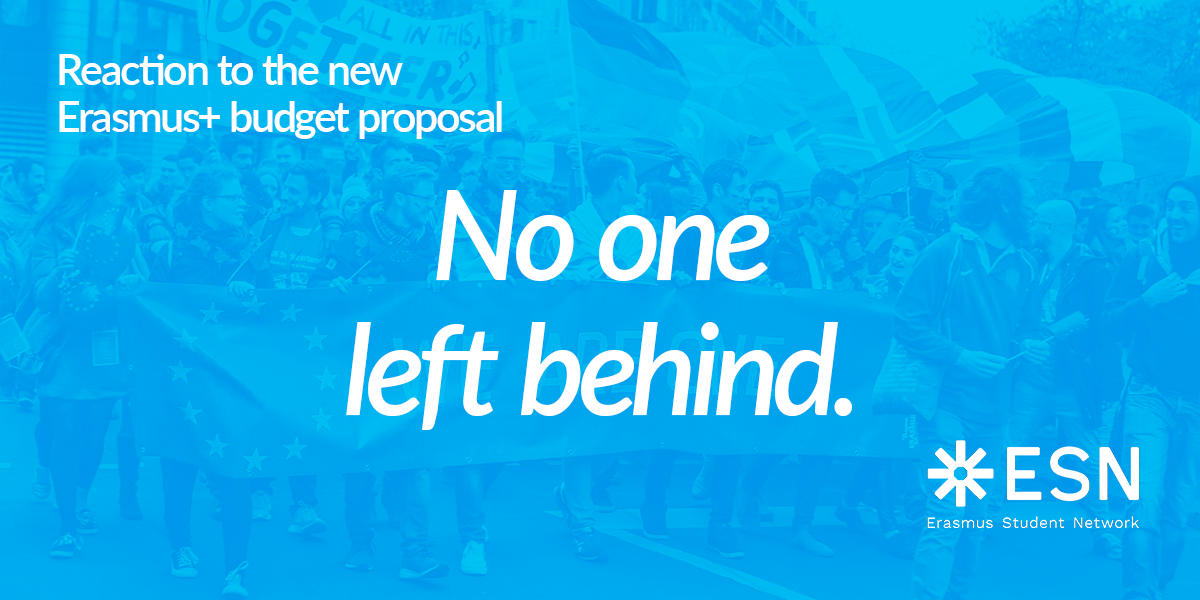
The reaction of the Erasmus Student Network on the Erasmus+ 2021-2027 budget proposal from May, 27th, 2020
On the 27th of May 2020, a new proposal for the EU Multiannual Financial Framework (2021-2027) was presented by the European Commission. It is intended to “protect lives and livelihoods, repair the Single Market, as well as to build a lasting and prosperous recovery”, according to the Commission. In the paragraphs below, we share our reactions to the budget and in particular the part that refers to the future Erasmus+ Programme.
The proposed budget (24,6 billion euros) for Erasmus+ is less than what the European Commission put forward in 2018 (26,4 billion euros), but higher than the one discussed by the European Council in February 2020 (21, 2 billion euros). The lowered budget for Erasmus+ was quickly criticised by the European Parliament’s Culture and Education Committee (CULT). The Erasmus Student Network (ESN) stands by the idea of strengthening the programme and firmly believes that an increased investment in EU youth programmes will contribute to societal progress through civic engagement, mobility, volunteering, and cooperation. More specifically, Erasmus+ is a vital EU programme aiming at empowering young people and promoting a European identity through youth, education, and training abroad, while broadening the participants’ experiences and awareness of Europe, and increasing their future chances in the job market.
Altering the budget of the programme should come with adjusting the targets and priorities set. The allocated larger budget compared to the Erasmus+ programme of 2014-2020 will support a wider and increased participation, but it will not triple the number of participants to 12 million people, the target initially set by the European Commission for the new 2021-2027 programme.
A key objective of the new programme is reaching more young people from diverse backgrounds and increasing participation of underrepresented groups. The proposed budget can boost the diversity of participation, but reaching this objective will highly depend on the initiatives established to ensure easier access and participation, through diversifying support and formats of mobility. Especially during the aftermath of COVID-19, it is crucial that the measures to ease the financial impacts are sufficient and do not constrain opportunities for students and youth.
Quality physical mobilities should remain a priority, and human contact, engagement and integration should continue to be at the core of the programme. While we recognise the necessity of distance learning as a way of safely complying with temporary social distance rules, virtual tools can only play a complementary role and never substitute a real physical mobility experience. The new programme should not prioritise online mobilities, nor should they alone be a way of achieving higher participation numbers. The increased budget should also guarantee quality support before, during and after mobility, and reinforce the upcoming Erasmus Charter for Higher Education (ECHE), which we outlined in a recent article.
The new features and additions proposed for the Erasmus+ programme 2021-2027 are ambitious and highly important, but their actual realisation considering the proposed decreased budget could be questioned. Actions such as the European Universities Initiative, DiscoverEU, small-scale partnerships, and partnerships between VET providers and other stakeholders, must come accompanied with new budget injections. If this is not the case, they will lead to a de facto budget decrease for the already existing parts of the programme.
Erasmus+ is one of the greatest projects of the European Union and should thus be an opportunity every young person can benefit from - not a privilege for the few, financially able. If the programme is expected to develop into a life-changing possibility for more people, then stronger financial support should be considered, where grants come closer to cover living expenses. In 2018, the average Erasmus+ grant for a higher education student was 366€/month, a quite insufficient amount that does not cover their actual monthly expenses, as highlighted for example by the Erasmus Student Network’s research report The International-Friendliness of Universities from 2016. Especially considering the financial impacts of the ongoing COVID-19 pandemic for students and youth, there will certainly be a need for methods to promote more inclusive mobility in the next Erasmus+ programme. In order to tackle this issue, the Erasmus Student Network, the European University Foundation, and the European Students’ Union have joined their forces and launched the #Εrasmus500 campaign, with the aim of raising the minimum Erasmus+ grant under the principles of simplicity, strong support and inclusiveness.
The Erasmus Student Network has made its position on financial investment in the Erasmus+ programme known through various past proposals and statements. In June 2018, the Erasmus Student Network released a reaction paper on the proposal of the European Commission for the new Erasmus+ programme, stating that a substantially bigger budget would be needed to cover all the ambitious objectives set out in the proposal. This was highlighted in another statement in October 2019, released together with the European Students’ Union, where we again stressed the need for a higher budget.
The new Erasmus+ programme aspires to introduce progressive elements to increase opportunities and widen participation for young Europeans. As negotiations move forward, the Erasmus Student Network urges the EU member states to give students and youth a greater importance in the upcoming negotiations, by increasing the budget allocated for the next Erasmus+ programme. Meanwhile, we will continue to advocate for a more qualitative, inclusive and sustainable programme, to allow the Erasmus Generation to play a crucial part in the “Next Generation EU”.


Follow ESN